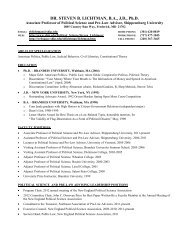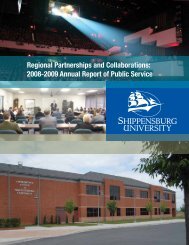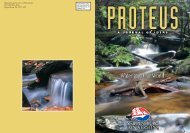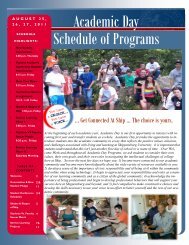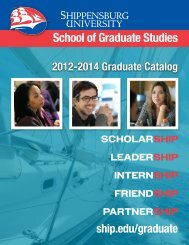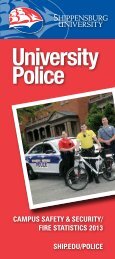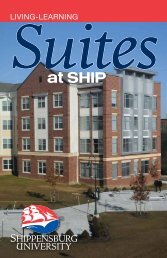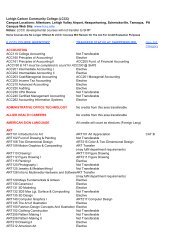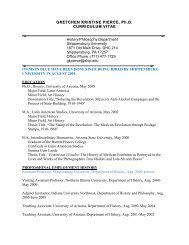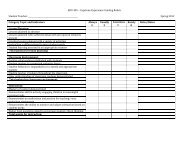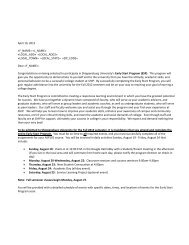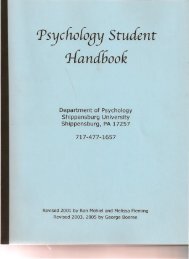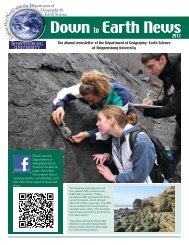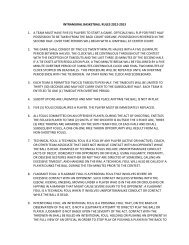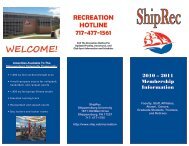2007-2008 Annual Report of Service - Shippensburg University
2007-2008 Annual Report of Service - Shippensburg University
2007-2008 Annual Report of Service - Shippensburg University
You also want an ePaper? Increase the reach of your titles
YUMPU automatically turns print PDFs into web optimized ePapers that Google loves.
Institute for Public <strong>Service</strong> 19<br />
Dr. Marian B. Schultz, Dean<br />
David Henriques, Assistant Dean<br />
Academic Success Program<br />
During Term V <strong>2008</strong>, the Academic<br />
Success Program (ASP) collaborated with<br />
numerous areas on <strong>Shippensburg</strong> <strong>University</strong>’s<br />
campus to run the “Reality Check” program<br />
with 110 conditionally admitted, under-prepared<br />
students. “Reality Check” is a program<br />
that simulates all the realities <strong>of</strong> life to include<br />
money management, career, taxes, day care,<br />
transportation, etc. Thirty-five volunteers were<br />
represented from Dean <strong>of</strong> Students Office, the<br />
faculty, the School <strong>of</strong> Education and Human<br />
<strong>Service</strong>s, Graduate Students and members <strong>of</strong><br />
the community.<br />
Gregory S. Ochoa, Ed.D., Director <strong>of</strong><br />
the ASP, serves on the board <strong>of</strong> directors for<br />
the Waynesboro Youth Soccer Association as<br />
the Director <strong>of</strong> Tournaments. The club runs<br />
a summer and fall tournament serving approximately<br />
600 players ranging in age from<br />
9-18 from South-Central Pennsylvania and<br />
Northern Maryland. Dr. Ochoa also supervises<br />
the older players who run the Special Needs<br />
Soccer Program in Waynesboro. The Special<br />
Needs team serves approximately ten players<br />
with Special Needs from the Waynesboro<br />
area.<br />
Dr. Ochoa served as the chair <strong>of</strong> the<br />
ACT 101 Student Leadership Conference<br />
committee as part <strong>of</strong> the Pennsylvania Act<br />
101 Director’s Association. Dr. Ochoa worked<br />
with other directors in the association to plan<br />
the conference. The conference was held in<br />
Gettysburg and served approximately 300 students<br />
and staff from approximately 70 Act 101<br />
programs around the State <strong>of</strong> PA.<br />
Program History<br />
<strong>Shippensburg</strong> <strong>University</strong> established<br />
a Higher Education Equal Opportunity<br />
Program, also known as the Academic Success<br />
Program/Act 101(ASP), thirty-one (31) years<br />
ago. The initial year <strong>of</strong> operation (1970), was<br />
solely supported financially by the <strong>University</strong>.<br />
In the second year, the program received funding<br />
from the Pennsylvania Department <strong>of</strong><br />
Education (PDE) and expanded. Funding from<br />
the <strong>University</strong> and Pennsylvania Department<br />
<strong>of</strong> Education continues today. The program<br />
name at <strong>Shippensburg</strong> <strong>University</strong> changed<br />
from the Act 101 program to the Academic<br />
Success Program as the program serves Act<br />
School <strong>of</strong> Academic<br />
Programs & <strong>Service</strong>s<br />
101 grant eligible students, as well as other developmental<br />
students.<br />
Originally, the purpose <strong>of</strong> Act 101 legislation<br />
was to provide access to college for<br />
under-prepared and low-income students primarily<br />
from large urban communities such as<br />
Philadelphia and Pittsburgh. The program’s<br />
current mission and goals are still the same;<br />
however, low income students from all ethnic<br />
backgrounds are actively recruited each year<br />
from urban, suburban and rural communities<br />
within Pennsylvania and bordering states<br />
that have an affiliation with <strong>Shippensburg</strong><br />
<strong>University</strong> and the State System <strong>of</strong> Higher<br />
Education.<br />
The Asset Leader program began in the<br />
summer <strong>of</strong> 2001. In the fall <strong>of</strong> 2001, the ASP<br />
began to <strong>of</strong>fer two courses from the School<br />
<strong>of</strong> Academic Programs and <strong>Service</strong>s, Student<br />
Voices 101 and 102. These additions were part<br />
<strong>of</strong> a first year initiative program supported by<br />
the president. The goal was to provide support<br />
for ASP students in the form <strong>of</strong> a three-credit<br />
course taught by program faculty. The Asset<br />
Leader program was created to provide peer<br />
support to students enrolled in the course. The<br />
asset leaders served as full-time peer support<br />
during the summer program and lived in the<br />
same residence hall as summer program students.<br />
In the summer <strong>of</strong> <strong>2008</strong>, the asset leader<br />
position was renamed to peer leaders with revised<br />
job duties.<br />
The 101 course is mandatory for all freshmen.<br />
It is a first year experience, student success<br />
course. The 102 course, which focused on<br />
leadership, is not currently being utilized. The<br />
course was <strong>of</strong>fered for two consecutive spring<br />
semesters. With input from the faculty and focus<br />
groups from the course, it was determined<br />
that the course as written was not meeting the<br />
students needs. The faculty will be reviewing<br />
this course in the next academic year.<br />
Another important change occurred in the<br />
summer program in 2004. Prior to that date,<br />
the program recruited and hired presenters to<br />
provide skill building in the areas <strong>of</strong> reading,<br />
writing and math. The students received no<br />
college credit for these workshop style classes.<br />
In the summer <strong>of</strong> 2004, all summer pre-college<br />
students were enrolled in two college-credit<br />
bearing courses. One <strong>of</strong> the courses could be<br />
a developmental course based on the student’s<br />
needs and the remaining courses were all general<br />
education courses that are required by<br />
all students at <strong>Shippensburg</strong> <strong>University</strong>. The<br />
idea behind this change came from committee<br />
meetings in the program and discussions with<br />
the dean. The outcome <strong>of</strong> these interactions<br />
was that it would be beneficial for students to<br />
have exposure to a college-level, credit-bearing<br />
course in the summer program as a transition<br />
from high school. Providing a college-level experience<br />
with intrusive support from program<br />
staff would help make the transition to the fall<br />
semester smoother. The following table shows<br />
the number <strong>of</strong> students who entered the summer<br />
program for the last five years, the number<br />
who completed the program and the number<br />
who earned a C in both summer courses, a<br />
requirement to return in the fall as a regular<br />
admitted student.<br />
Year<br />
ASP<br />
Enrollment<br />
ASP<br />
Completed<br />
Summer<br />
Program<br />
ASP<br />
Returned<br />
in Fall<br />
2004 113 107 106<br />
2005 129 106 104<br />
2006 126 82 87<br />
<strong>2007</strong> 123 112 110<br />
<strong>2008</strong> 113 103 103<br />
In <strong>2007</strong>, a proposal was co-written with<br />
the director <strong>of</strong> the Learning Center to create<br />
a dual position <strong>of</strong> learning specialist and ASP<br />
tutorial coordinator. This dual position has<br />
helped the ASP coordinate better usage <strong>of</strong> tutorial<br />
services and assist the Learning Center<br />
with its increased overall usage.<br />
In the fall <strong>of</strong> <strong>2008</strong>, PDE revised the<br />
process for applying for the Act 101 grant<br />
and made it a competitive grant. In addition,<br />
new guidelines have been written with more<br />
elaborate reporting requirements to PDE.<br />
<strong>Shippensburg</strong> <strong>University</strong> has successfully been<br />
awarded the grant for the next three years and<br />
is working diligently with our students to meet<br />
the reporting requirements.<br />
<strong>Shippensburg</strong> <strong>University</strong>’s Academic<br />
Success program’s (ASP) mission is to provide<br />
access and support to under-prepared students<br />
who have the potential to succeed in higher<br />
education. The ASP strives to develop and<br />
maintain a comprehensive academic co-curricular<br />
support system for the purpose <strong>of</strong> enhancing<br />
student persistence toward graduation.



